Geothermal vs. natural gas for our new home
Bri
8 years ago
last modified: 8 years ago
Featured Answer
Sort by:Oldest
Comments (11)
Virgil Carter Fine Art
8 years agoRelated Discussions
regular geothermal vs. direct geothermal
Comments (36)Geothermal HVAC Myths Busted https://www.minisplitunit.org/ 1. Geothermal HVAC systems are not considered a renewable technology because they use electricity 2. Photovoltaic and wind power are more favorable renewable technologies when compared to geothermal HVAC systems. 3. Geothermal HVAC needs lots of yard or real estate in which to place the polyethylene piping earth loops. 4. Geothermal HVAC heat pumps are noisy. 5. Geothermal systems eventually “wear out.” 6. Geothermal HVAC systems only work in heating mode. 7. Geothermal HVAC systems cannot heat water, a pool, and a home at the same time. Fact: Systems can be designed to handle multiple loads simultaneously. 8. Geothermal HVAC systems put refrigerant lines into the ground. 9. Geothermal HVAC systems use lots of water. 10. Geothermal HVAC technology is not financially feasible without federal and local tax incentives....See MoreNatural Gas vs Propane vs Geothermal
Comments (10)keadog Based on your options, GT should be in the trade space. It sounds like you are in a rural area. We built in a rural area in 2007 and have a Gt system - propane was our only other option (we only use that for cooking and tankless hot water). Here are some lessons learned from my expereience: 1) Make sure you factor in the cost to run the electrical service to your home AND make sure you get enough amperage. The GT heat pumps need quite a bit of current on start up - my 5 ton heat pump requires a 70 amp circuit and my 3 ton heat pumps require 30 amps. Once the heat pumps start they draw less current - but you still need to factor the start up load into the overall needs for the house. The added cost for additional amperage is relatievly cheap when they install - but very expensive to add later. Based on your house size I would reocmmend a 400 amp service if you go with GT. 2) If you do chose GT, I strongly recommend a propane auxilliary heater instead of the electical heat packs. Have the system wired so that a small backup generator can power the thermostats, the HVAC fan, and the propane heater ingition. That way, when the power goes out you can still have heat. An alternative is to install a larger backup generator that can drive your GT heat pump and loop but that might not be cost effective. Either way - make sure you factor in a backup heating system into your plans. 3) Make sure that the company who is doing the GT system has been in the business for many years AND is available to provide service. These systems have to be designed properly and must be tailored to your specific site and house design. They are expensive and you need to have it done right AND have a reliable company that can service it when needed. If you can't find a highly rated local company to install and maintain the system then I would not recommend GT. 4) Make sure you factor in the building envelope: windows, doors, sealing and insulation into the overall HVAC design. If the envelope isn't tightly sealed and insulated well you won't be happy with a GT system. 5) Do your own research on the Heat pump manufacturers - use this site to ask the experts on the proposed equipment. Make sure it is a quality product. 6) Ask the HVAC contractor what type of monitoring system they provide so that you know that the system is working as efficiently as designed. Mine had nothing and I had to add indicators such as pressure and temperature guages over time. Goodluck with the build....See MoreNatural Gas Forced Air or Geothermal for small new build?
Comments (6)You didnâÂÂt mention what you electrical rate is per kWh. You did mention some pretty magic words, âÂÂI will need a wellâÂÂ. Since youâÂÂll be drilling a well anyways, that opens the possibility of exploring an open loop geothermal heat pump system. Driller just has to make sure the well drilled can pump enough water for both domestic water supply AND geothermal. The well should be deep enough that if the water table drops due to drought or neighbors on the same aquifer that youâÂÂre deep enough to not run dry. The other issue is responsible discharge of âÂÂleaving loop waterâÂÂ. The best way would be back into the same aquifer at about 80 to 100 feet horizontally apart. The only âÂÂmodificationâ to the water is a change in water temperature of just a few degrees up or down depending on whether youâÂÂre heating or air-conditioning. ThatâÂÂs it - no other changes to water quality - so it can go back into the same aquifer! Open loop does require more maintenance than closed loop. Water quality would have to be tested for suitability but this sounds like it might be a relatively shallow well that would keep pumping cost low. Open loop also represents the possibility for the highest theoretical geothermal heat pump efficiencies (COP) possible. I would suggest separating all the HVAC, geothermal and well drilling from the general contract if you feel youâÂÂre up to the task. Hire properly accredited companies. I would also suggest that if you do go the geothermal route that you add to the contract a âÂÂCancellation DateâÂÂ, particularly with the drilling and ground loops. The last thing you want to hear after signing and waiting for a driller to appear is that, âÂÂThis is my busy season, IâÂÂll get to you as soon as I canâÂÂ! You could also consider natural gas for the geothermal backup, particularly if youâÂÂd be using it for other applications as well. It would however add additional installation costs, such as, gas line and venting but should be discussed and explored. IMO SR Here is a link that might be useful: International Ground Source Heat Pump Association at Oklahoma State University...See MoreHas anyone gone from natural gas to geothermal?
Comments (9)I live in Northern VA and switched from NG to geothermal but also switched houses so I can't give you exact apples to apples comparisons. But here are some numbers. The"old" house was a 1993 colonial 2 story with basement and roughly 2700 square feet on 1st and second floor, and about 700 square feet finished basement. It had a 3 ton York HVAC system for basement and main, 1.5 ton York for second floor. The house had 2x4 construction with pink insulation and was well built for the time but not too good by today's standards. During the worst winter I can recall in the mid to late 90's (remember the back to back BIG snows we had I think in Jan 1996?) my heating bill was 300 dollars. I remember that well becuase that was a big number compared to normal months of maybe 200 dollars at worst. My electric bill ran around 65 dollars per month normally in the winter. In summer, things flipped and my peak electric was around 350, while the gas was maybe 20 dollars for the hotwater. The new house is a 5800 square feet 1st and second floors, and I have a 3300 sq ft basement that is partially finished and conditioned. This house has 2x6 construction with blown cellulose and is very tightly sealed. It has a 12 ton geothermal system with 12 horiztonal slinky loops, a 5 ton unit and a 3 ton unit for the first floor and basement (6600 sq ft total) and I have a 3 ton unit for second floor. With this system, my peak electric bill in winter is around 350 -400 dollars BUT ~100 of that is lights, refrig's etc. So my peak HVAC portion of the bill is around 250 to 300 dollars. In the summer, AC runs a little higher and is around 300 to 350 for the HVAC portion. In non peak months, my total electric bill (HVAC and eveything else) is around 200. So I was very happy with my selection of GT but here are some cautions. The front end costs - even with tax credits - is high. I paid around 5500 per ton for the system (that included duct work for new construction, the 3 heat pumps, the loop plumbing and pumps, and the loop field excavation). I plan on lving in the house for at least 20 years if not more - so I can spread my costs over a long time horizon. This is something you have to factor into the business case. I also had complete control of the build - so I could pay for the best insulation package I could afford. With GT, you really need to make sure that the house is well insululated and sealed or you might be dissapointed with the results. It isn't the same as a my gas heating system where I could blast out very high BTU's on demand. I am very careful on how I run the system. I leave the Tstats on one setting in winter and one in summer - no setbacks. if I had to do it all over again I would have made two changes: 1) install a gas heater as the auxilliary/emergency heat on the main 5 ton unit, and 2) wired the 5 ton unit so that in power outages - my backup generator could power the tstat controls, the secondary heater, and the fan. The way my system is wired, the heat pumps get one 240V feed and then inside the unit, split out power for tstat transformer, fan, compressor, etc. So when we loose power, i loose GT heat. My backup heating system is a wood burning firpelace insert that is rated as a heater - and that works fine. I have to set up standalone fans to circulate the heat around the house. With a little extra work and cost - I could have had a much nicer backup haeting system built right into the GT system. I hope this helps....See MoreLinda Gomez
8 years agoartemis_ma
8 years agoSpringtime Builders
8 years agoILoveRed
8 years agojemdandy
8 years agomissymoo12
8 years agoSpringtime Builders
8 years agoBri
8 years agolast modified: 8 years agoHU-511166348
3 years ago
Related Stories
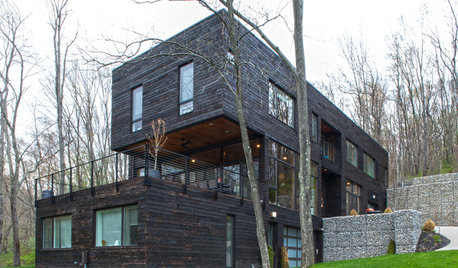
HOUZZ TOURSMy Houzz: Modernism Takes a Natural Turn in Pennsylvania
Generous wood throughout and woodsy sights outdoors soften and warm this home’s modern lines
Full Story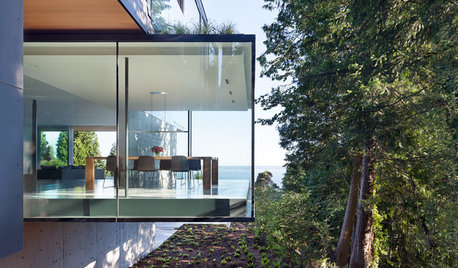
MODERN HOMESHouzz Tour: A Cubist Confection Oriented Toward Nature
Dramatic yet understated, a West Vancouver house defers to its woodland and ocean setting
Full Story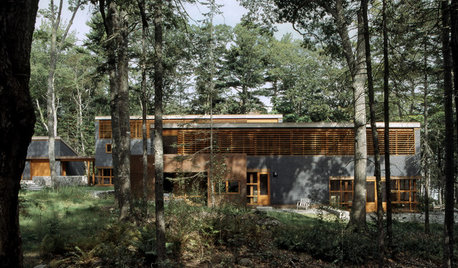
ARCHITECTURE'Houses of Maine' Puts Modernism in Its Place — in Nature
Set in the meadows and woods of Maine, the homes in this book give modern architecture a natural context
Full Story
DECORATING GUIDESNature’s Color Wisdom: Lessons on Green From the Great Outdoors
Green will grow on you for interiors when you look outside for ideas on how to use it
Full Story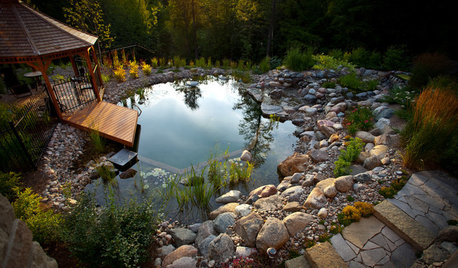
LANDSCAPE DESIGNNatural Swimming Pools: More Beauty, No Chemicals
Keep your skin and the environment healthy with a pool that cleans itself, naturally
Full Story
HOUZZ TOURSMy Houzz: Nature Meets Nurture in a Canadian Island Retreat
Wood and nature-inspired artwork create a soothing oceanside condo for a traveling British Columbia family
Full Story
DECORATING GUIDESTextile Textbook: Know Your Natural Fibers
Whether you desire fresh linen sheets or a swanky mohair rug, Mother Earth has you covered
Full Story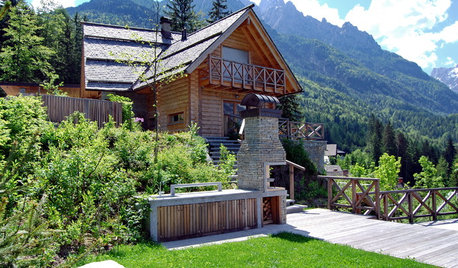
LANDSCAPE DESIGNStyle and Nature Come Together in a Slovenian Landscape Design
Natural plantings and local materials create a memorable outdoor experience in picturesque Kranjska Gora
Full Story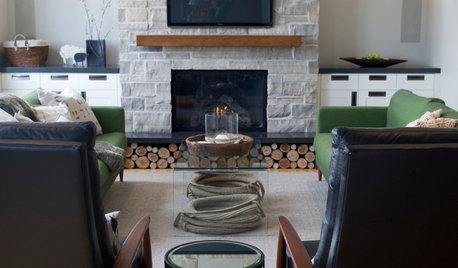
ROOM OF THE DAYRoom of the Day: A New Family Room’s Natural Connection
Stone and wood plus earthy colors link a family room to its woodsy site and create a comfy gathering spot
Full Story
HOUSEKEEPINGBaking Soda: The Amazing All-Natural Cleanser You Already Own
Battle grime, banish odors and freshen clothes with this common nontoxic cupboard staple
Full StorySponsored
Custom Craftsmanship & Construction Solutions in Franklin County







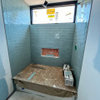

Springtime Builders